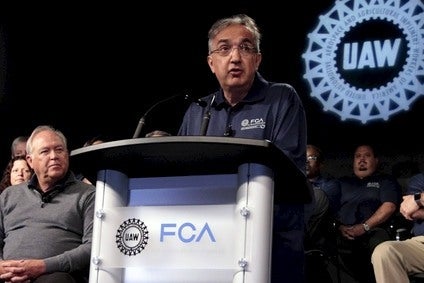
Fiat Chrysler Automobiles said it had "reached a tentative agreement on a new collective bargaining agreement with the UAW, covering approximately 40,000 represented members". The agreement is subject to UAW member ratification, the automaker said in a statement and the company could not discuss the specifics of the agreement pending a ratification vote – an internal UAW process.
The Detroit News reported the tentative agreement agreed on Tuesday night (15 September) addresses the critical issues of a two-tier pay structure and health care costs.

Discover B2B Marketing That Performs
Combine business intelligence and editorial excellence to reach engaged professionals across 36 leading media platforms.
UAW president Dennis Williams was quoted as saying the proposed deal was “balanced” and keeps both sides competitive. At a joint press conference, he and Fiat Chrysler CEO Sergio Marchionne strongly suggested the deal includes a health care co-op — a concept floated by the UAW during negotiations. He said it also addresses the union’s two-tier pay system that members say has divided factory floors, and it rewards workers for sacrifices made in recent years – the union’s main goals heading into negotiations.
“We believe that we have met those goals,” Williams told the Detroit News and other assembled media shortly after the tentative deal was announced nearly 19 hours after the sides agreed to an 'hour-by-hour' contract extension after missing the Monday midnight deadline. “But ultimately, our membership will make the final decisions.”
Williams, Marchionne and top negotiators declined to discuss exact details of the tentative agreement until it had been discussed with the union’s membership, the report said.
Marchionne did say the contract addresses the issue of the tier-one/tier-two pay disparity under which newer workers are paid a lower hourly rate. He said it would go away “over time” but would not elaborate if the system would be eliminated under the tentative deal.
One of the most radical changes in the new deal could be a health care co-op pool that Marchionne said “will benefit the much larger population in terms of purchasing capability … ”
“I think it’s embedded in the spirit of the agreement and I sincerely hope that it gets implemented,” Marchionne said, without providing any details.
A health care pool at all three Detroit automakers could pool all active salaried and hourly workers to help reduce automakers’ rising health care costs and maintain benefits for its members in the future — similar to what the VEBA does for the current 860,000 UAW retirees and dependents, the Detroit paper noted.
Union leaders now have to sell the deal to their 35,700 members at Fiat Chrysler. The process can take weeks but it’s extremely rare for the membership to completely reject a national agreement.
“And now it’s our job to go out and explain it to people so they understand what a great job I believe we did,” said UAW vice president Norwood Jewell, head of the union’s bargaining with Fiat Chrysler.
The Detroit News said the proposed pact was expected to set a pattern for General Motors and Ford to follow in their ongoing negotiations. GM and Ford announced indefinite contract extensions on Monday, a typical move if a contract is not reached by the deadline.
“This is a contract that we can very well pattern, but pattern is very unique to each company,” Williams said, adding “each company has different unique ways of operating.” He also mentioned he would look at the profitability and status of each company.
The paper noted that, during the last round of negotiations in 2011, 58% of Chrysler production workers voted to ratify the contract. Union rules require contracts to be ratified by both skilled trades and production workers. Only 44% of the company’s skilled trades workers voted for the contract. UAW leaders in closed session voted to overturn that veto and sign the agreement.
Looming over the this year’s negotiations is Michigan’s right-to-work legislation, which gives workers the ability to withdraw from the union and stop paying dues after the current contracts expire. This is the first collective bargaining since the law went into effect in March 2013, the paper said.






